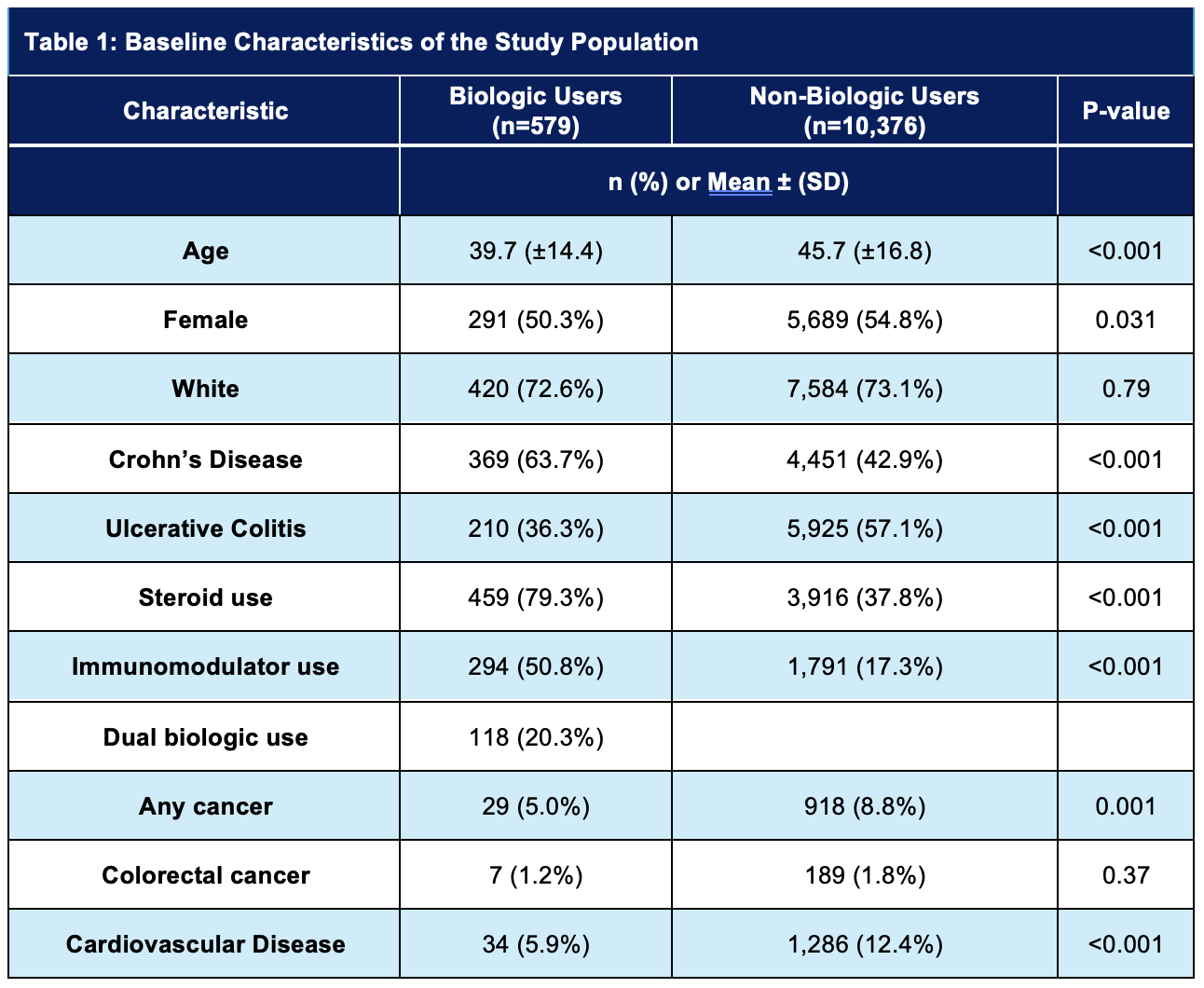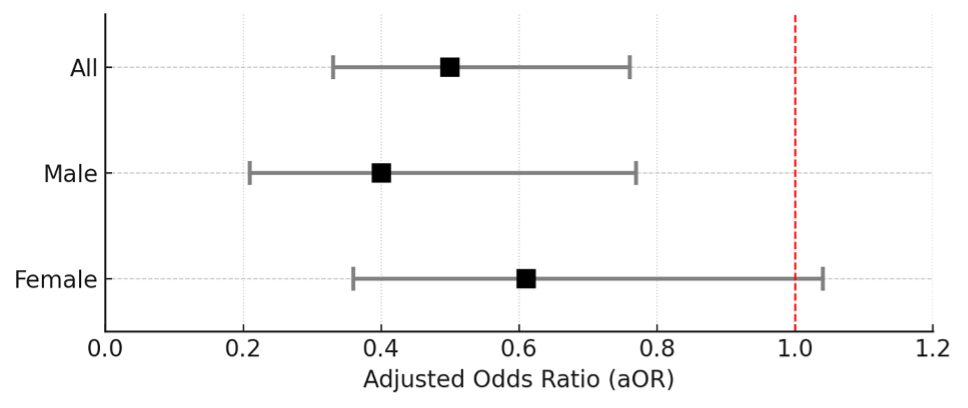Monday Poster Session
Category: IBD
P3293 - Sex Differences in Cancer Risk Among Patients With Inflammatory Bowel Diseases Treated With Biologics: A Large Retrospective Analysis
Monday, October 27, 2025
10:30 AM - 4:00 PM PDT
Location: Exhibit Hall

Joelle Sleiman, MD
Staten Island University Hospital, Northwell Health
Staten Island, NY
Presenting Author(s)
Joelle Sleiman, MD1, Battoul Fakhry, MD2, Harika Kandlakunta, MD1, Omar Abureesh, MD1, Liliane Deeb, MD1
1Staten Island University Hospital, Northwell Health, Staten Island, NY; 2Lerner Research Institute, Cleveland Clinic, Cleveland, OH
Introduction: Biologic therapies have transformed the treatment of inflammatory bowel disease (IBD), providing targeted control of chronic inflammation, a major factor in malignancy in this population. However, little is known about their long-term impact on the risk of cancer in the IBD population. Particularly, it remains unclear if the association between biologic therapy and malignancy varies by sex among IBD patients. We aim to investigate sex-specific cancer risk among patients with IBD treated with biologics.
Methods: We conducted a retrospective, multi-center cohort study at Northwell Health between 2008 and 2023. We included 11,325 patients with IBD including ulcerative colitis (UC) and Crohn’s disease (CD). Patients younger than 18 years or with a history of cancer prior to IBD diagnosis were excluded (n= 370). Data on demographics and IBD medications were extracted from medical records. Logistic regression estimated odds ratios (ORs) for any cancer associated with biologic use, adjusting for age, sex, IBD subtype, and steroid use. Analyses were stratified by sex and IBD subtypes, and propensity score matching was performed as a sensitivity analysis.
Results: Among 10,955 patients with IBD, 54.6% were females and 5.3% were on biologics (Table 1). Biologics were associated with a 50% reduction in the odds of any cancer (aOR 0.50, 95% CI 0.33-0.76). This protective effect was stronger with dual biologics therapy (aOR 0.44, 95% CI 0.19-0.88). In males, the use of biologics was associated with a significantly lower risk of any cancer (aOR 0.40, 95% CI 0.21-0.77), whereas in females, this risk was not statistically significant (aOR 0.61, 95% CI 0.36-1.04) (Fig.1). Only males with UC had lower odds of developing cancer (aOR 0.38, 95% CI 0.16-0.91). For colorectal cancer specifically, there was no significant association with biologic use in either sex.
Discussion: Biologic therapy in IBD patients was associated with a lower risk of developing malignancy only in males, suggesting possible underlying sex-related biological or hormonal attributes which could influence long-term cancer outcomes. Additional research is warranted on this subject to validate these sex-specific differences and to clarify their underlying mechanisms.

Figure: Baseline Characteristics of the Study Population

Figure: Forest plot of sex-specific adjusted Odds Ratios of any malignancy in IBD patients using biologics.
Disclosures:
Joelle Sleiman indicated no relevant financial relationships.
Battoul Fakhry indicated no relevant financial relationships.
Harika Kandlakunta indicated no relevant financial relationships.
Omar Abureesh indicated no relevant financial relationships.
Liliane Deeb indicated no relevant financial relationships.
Joelle Sleiman, MD1, Battoul Fakhry, MD2, Harika Kandlakunta, MD1, Omar Abureesh, MD1, Liliane Deeb, MD1. P3293 - Sex Differences in Cancer Risk Among Patients With Inflammatory Bowel Diseases Treated With Biologics: A Large Retrospective Analysis, ACG 2025 Annual Scientific Meeting Abstracts. Phoenix, AZ: American College of Gastroenterology.
1Staten Island University Hospital, Northwell Health, Staten Island, NY; 2Lerner Research Institute, Cleveland Clinic, Cleveland, OH
Introduction: Biologic therapies have transformed the treatment of inflammatory bowel disease (IBD), providing targeted control of chronic inflammation, a major factor in malignancy in this population. However, little is known about their long-term impact on the risk of cancer in the IBD population. Particularly, it remains unclear if the association between biologic therapy and malignancy varies by sex among IBD patients. We aim to investigate sex-specific cancer risk among patients with IBD treated with biologics.
Methods: We conducted a retrospective, multi-center cohort study at Northwell Health between 2008 and 2023. We included 11,325 patients with IBD including ulcerative colitis (UC) and Crohn’s disease (CD). Patients younger than 18 years or with a history of cancer prior to IBD diagnosis were excluded (n= 370). Data on demographics and IBD medications were extracted from medical records. Logistic regression estimated odds ratios (ORs) for any cancer associated with biologic use, adjusting for age, sex, IBD subtype, and steroid use. Analyses were stratified by sex and IBD subtypes, and propensity score matching was performed as a sensitivity analysis.
Results: Among 10,955 patients with IBD, 54.6% were females and 5.3% were on biologics (Table 1). Biologics were associated with a 50% reduction in the odds of any cancer (aOR 0.50, 95% CI 0.33-0.76). This protective effect was stronger with dual biologics therapy (aOR 0.44, 95% CI 0.19-0.88). In males, the use of biologics was associated with a significantly lower risk of any cancer (aOR 0.40, 95% CI 0.21-0.77), whereas in females, this risk was not statistically significant (aOR 0.61, 95% CI 0.36-1.04) (Fig.1). Only males with UC had lower odds of developing cancer (aOR 0.38, 95% CI 0.16-0.91). For colorectal cancer specifically, there was no significant association with biologic use in either sex.
Discussion: Biologic therapy in IBD patients was associated with a lower risk of developing malignancy only in males, suggesting possible underlying sex-related biological or hormonal attributes which could influence long-term cancer outcomes. Additional research is warranted on this subject to validate these sex-specific differences and to clarify their underlying mechanisms.

Figure: Baseline Characteristics of the Study Population

Figure: Forest plot of sex-specific adjusted Odds Ratios of any malignancy in IBD patients using biologics.
Disclosures:
Joelle Sleiman indicated no relevant financial relationships.
Battoul Fakhry indicated no relevant financial relationships.
Harika Kandlakunta indicated no relevant financial relationships.
Omar Abureesh indicated no relevant financial relationships.
Liliane Deeb indicated no relevant financial relationships.
Joelle Sleiman, MD1, Battoul Fakhry, MD2, Harika Kandlakunta, MD1, Omar Abureesh, MD1, Liliane Deeb, MD1. P3293 - Sex Differences in Cancer Risk Among Patients With Inflammatory Bowel Diseases Treated With Biologics: A Large Retrospective Analysis, ACG 2025 Annual Scientific Meeting Abstracts. Phoenix, AZ: American College of Gastroenterology.

